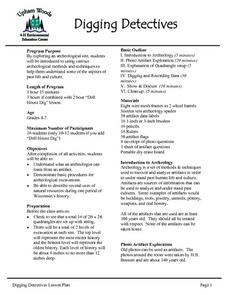Curated OER
Mud Splat Craters
Students simulate crater formation using mud. In this earth science lesson, students identify the features of a crater. They explain how the force of impact affect the crater's appearance.
Curated OER
Digging Detectives
Students demonstrate basic procedures for archeological excavations. They explore an archeological site, students using various archeological methods and techniques to determine some of the aspects of past life and culture.
Curated OER
The Magic School Bus Gets Swamped
Students participate in an experiment that shows them how wetlands filter dirty water. They work in groups to accomplish this experiement with the help of supervisors. A bulletin board can be created to show the plants and animals that...
Curated OER
Erosion in Different Soils [Erosion Races]
Fourth graders review how erosion can happen by wind, water, and gravity which they studied in previous instructional activity. They attempt to discover if all soils erode at the same rate. In small groups, 4th graders experiment with...
Curated OER
Explor-A-Pond: 5th Grade Soil Erosion
Fifth graders compare and contrast the rate of soil erosion along water and along a vegetation area. They observe the differences and record their information and write a hypothesis of what they think happen if the erosion continues.
Curated OER
Don't Water....Shed A Tear#145
Students examine the definition and attributes of tributaries and watersheds. They design a landscape which includes a mountain, a river, a lake and other appropriate items. They observe as the teacher pours water through the landscape...
Curated OER
Suitcase, Parfleche and 'Isaptakay
Third graders explore farfeche and how the Nez Perce people use natural materials to derive colors for their artwork. They explore traditional paints and dyes used by the Nez Perce and create their own parfleche 'isaptakay.
Curated OER
Shine Those Shades!
First graders observe as the /h/ sound is demonstrated and repeat it themselves. They practice saying a tongue twister using the /h/ sound stretching out the sound at the beginning of the words. They then take out primary paper and...
Curated OER
Grow a Plant
Young scholars combine their prior knowledge about plants with a garden learning activity. In this science gardening instructional activity, students discuss what plants need to survive. Young scholars then plant a seed themselves and...
Curated OER
Household Waste (Down the Drain)
Students brainstorm in small groups about the various ways water comes into their house. They list ways wastewater is produced in and around the home. They do an at-home inventory of all water drains and report their findings to the class.
Curated OER
Ecosystem Soil Study
Sixth graders take soil samples and analyze the samples and ecosystems found within them.
Curated OER
Forming a Hypothesis
In this hypothesis worksheet, students read about how to form a hypothesis and how to collect observations. Students go through the 4 steps of forming a hypothesis.
Curated OER
Water and Rice Agriculture
Second graders investigate the agriculture of rice by reading a study guide. In this food making lesson, 2nd graders read about the irrigation of rice fields used for harvesting. Students write three sentences about the rice irrigation...
Curated OER
ESL-Idioms
In this ESL idiom worksheet, students answer 10 multiple choice questions, choosing the idiom similar to given words. A website reference is included for additional resources.
Smithsonian Institution
Smithsonian Learning Lab: Digging Up Dirt: How Paleontologists Bring Dinosaurs Back to Life
Teachers can download this teaching package that introduces students to the science of paleontology. Fossil formulation and details about the work of paleontologists are discussed. Find out how paleontologists discover, stabilize, and...





![Erosion in Different Soils [Erosion Races] Lesson Plan Erosion in Different Soils [Erosion Races] Lesson Plan](http://content.lessonplanet.com/resources/thumbnails/140405/large/cgrmlwnvbnzlcnqymdezmdmyos01nde3lxfmmzy0dc5qcgc.jpg?1414240121)










